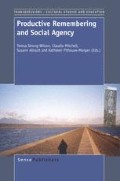Abstract
When looking at the everyday influence of television, I begin from an assumption that narratives of popular culture can potentially be used in the classroom and daily life to promote “critical and empowering pedagogical encounter[s]” (Giroux and imon 1989, 25) while also supporting the schemes we invent for interpreting andenunciating our own memories and life stories.
Access this chapter
Tax calculation will be finalised at checkout
Purchases are for personal use only
Preview
Unable to display preview. Download preview PDF.
References
Ahmed, Sara. (2006)a. “Orientations: Toward a Queer Phenomenology.” GLQ: A Journal of Lesbian and Gay Studies 12(4), 543–74. doi:10.1215/10642684–2006-002
———. (2006)b. Queer Phenomenology: Orientations, Objects, Others. Durham, NC: Duke University Press.
Barthes, Roland. (1975). The Pleasure of the Text. Translated by Richard Miller. New York: Farrar, Straus, and Giroux. First published in French in 1973.
Britzman, Deborah P. (1998). Lost Subjects, Contested Objects: Toward a Psychoanalytic Inquiry of Learning. Albany: State University of New York Press.
———. (2003). Practice Makes Practice: A Critical Study of Learning to Teach. Rev. Ed. Albany: State University of New York Press.
———. (2009). The Very Thought of Education: Psychoanalysis and the Impossible Professions. Albany: State University of New York Press.
Britzman, Deborah P., & Alice J. Pitt. (1996). “Pedagogy and Transference: Casting the Past of Learning into the Presence of Teaching.” Theory into Practice 35(2), 117–23. doi:10.1080/00405849609543711
Buonanno, Milly. (2008). The Age of Television: Experiences and Theories. Translated by Jennifer Radice. Chicago: Intellect Books, The University of Chicago Press.
de Lauretis, Teresa. (1994). The Practice of Love: Lesbian Sexuality and Perverse Desire. Bloomington: Indiana University Press.
———. (2008). Freud’s Drive: Psychoanalysis, Literature and Film. New York: Palgrave Macmillan.
Derrida, Jacques. (1996). Archive Fever: A Freudian Impression. Translated by Eric Prenowitz. Chicago: The University of Chicago Press. First published in French in 1995.
Ellsworth, Elizabeth Ann. (1997). Teaching Positions: Difference, Pedagogy, and the Power of Address.New York: Teachers College Press.
Felman, Shoshana. (1987). Jacques Lacan and the Adventure of Insight: Psychoanalysis in Contemporary Culture. Cambridge, MA: Harvard University Press.
———. (2007). The Claims of Literature: A Shoshana Felman Reader. Edited by Emily Sun, Eyal Peretz, & Ulrich Baer. New York: Fordham University Press.
Fiske, John. (1987). Television Culture. New York: Methuen.
Giroux, Henry A., & Roger I. Simon. (1989). “Popular Culture as Pedagogy of Pleasure and Meaning.” In Popular Culture, Schooling, and Everyday Life, edited by Henry A. Giroux & Roger I. Simon, 1–29. Toronto: Ontario Institute for Studies in Education Press.
Grosz, Elizabeth. (1994). “Refiguring Lesbian Desire.” In The Lesbian Postmodern, edited by Laura Doan, 67–84. New York: Columbia University Press.
Grumet, Madeleine R. (1988). Bitter Milk: Women and Teaching. Amherst: University of Massachusetts Press.
———. (2006). “Romantic Research: Why We Love to Read.” In Love’s Return: Psychoanalytic Essays on Childhood, Teaching, and Learning, edited by Gail M. Boldt & Paula M. Salvio, 207–25. New York: Routledge.
jagodzinski, j. (2004). “Teaching as Sinthome: An Ethics of the Real.” JCT: Journal of Curriculum Theorizing 20(1), 23–37. http://journal.jctonline.org/index.php/jct
Joyrich, Lynne. (2009). “Epistemology of the Console.” In Queer TV: Theories, Histories, Politics, edited by Glyn Davis & Gary Needham, 15–47. New York: Routledge.
Kennedy, Roger. (2010). “Memory and the Unconscious.” In Memory: Histories, Theories, Debates, edited by Susannah Radstone & Bill Schwarz, 179–97. New York: Fordham University Press.
Kuhn, Annette. (2000). “A Journey through Memory.” In Memory and Methodology, edited by Susannah Radstone, 179–96. New York: Berg.
Otte, George. (1995). “In-Voicing: Beyond the Voice Debate.” In Pedagogy: The Question of Impersonation, edited by Jane Gallop, 147–54. Bloomington: Indiana University Press.
“Pilot.” 2009. Glee. Fox video, 43:54, May 19. http://www.fox.com/glee/recaps/season-1/episode-1/
Probyn, Elspeth. (1996). Outside Belongings. New York: Routledge.
Robertson, Judith P. (1997). “Fantasy’s Confines: Popular Culture and the Education of the Female Primary-School Teacher.” In Learning Desire: Perspectives on Pedagogy, Culture, and the Unsaid, edited by Sharon Todd, 75–95. New York: Routledge.
Robertson, Judith P., & Linda A. Radford. (2009). “The Private Uses of Quiet Grandeur: A Meditation on Literary Pilgrimage.” Changing English 16(2), 203–9. doi:10.1080/13586840902863186
Sartre, Jean-Paul. (2001). Being and Nothingness: An Essay in Phenomenological Ontology. Special abr. Ed. Translated by Hazel E. Barnes. New York: Citadel Press. First published in French in 1943.
Serjeant, Jill. (2009). “‘Glee’ Brings Joy to Beleaguered Music Industry.” Reuters, November 9. http://www.reuters.com/article/2009/11/09/us-glee-idUSTRE5A85EL20091109
Simon, Roger I. (1992). Teaching against the Grain: Texts for a Pedagogy of Possibility. New York: Bergin & Garvey.
———. (1995). “Face to Face with Alterity: Postmodern Jewish Identity and the Eros of Pedagogy.” In Pedagogy: The Question of Impersonation, edited by Jane Gallop, 90–105. Bloomington: Indiana University Press
Williams, Raymond. (2003). Television: Technology and Cultural Form. Edited by Ederyn Williams. New York: Routledge. First published 1974.
Winter, Jay. (2010). “Sites of Memory.” In Memory: Histories, Theories, Debates, edited by Susannah Radstone & Bill Schwarz, 312–24. New York: Fordham University Press.
Wolfreys, Julian. (2004). Critical Keywords in Literary and Cultural Theory. New York: Palgrave Macmillan.
Sound Recordings
Cain, Jonathan, Steve Perry, & Neal Schon. (1981). “Don’t Stop Believin’.” On Journey’s Escape. Columbia. LP.
Cronin, Kevin. (1984). “I Can’t Fight This Feeling.” On REO Speedwagon’s Wheels Are Turning. Epic.
Editor information
Editors and Affiliations
Rights and permissions
Copyright information
© 2013 Sense Publishers
About this chapter
Cite this chapter
Lewkowich, D. (2013). The Teacher’s Dream. In: Strong-Wilson, T., Mitchell, C., Susann, A., Pithouse-Morgan, K. (eds) Productive Remembering and Social Agency. Transgressions. SensePublishers, Rotterdam. https://doi.org/10.1007/978-94-6209-347-8_12
Download citation
DOI: https://doi.org/10.1007/978-94-6209-347-8_12
Publisher Name: SensePublishers, Rotterdam
Online ISBN: 978-94-6209-347-8
eBook Packages: Humanities, Social Sciences and LawEducation (R0)


